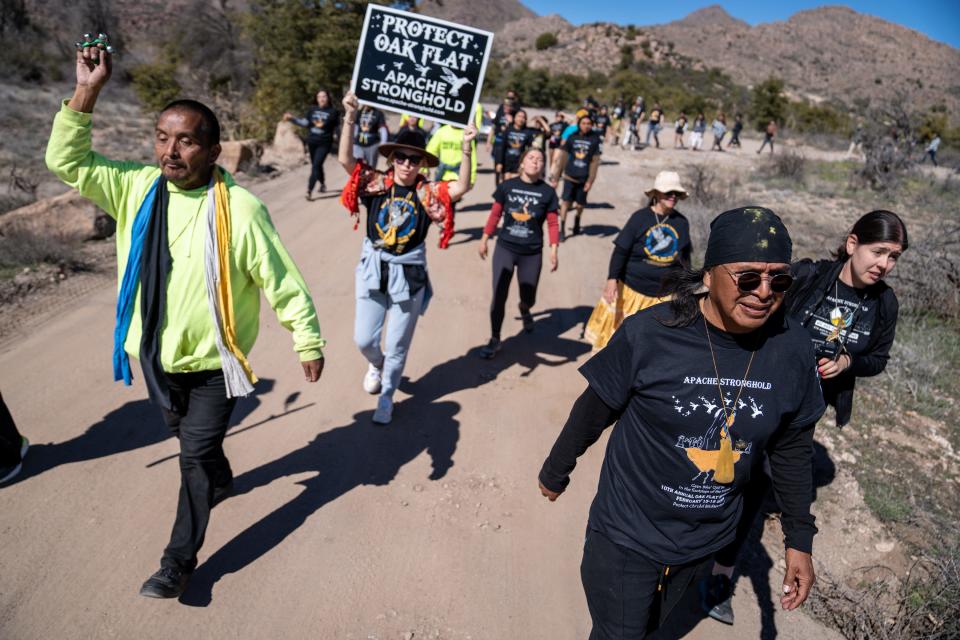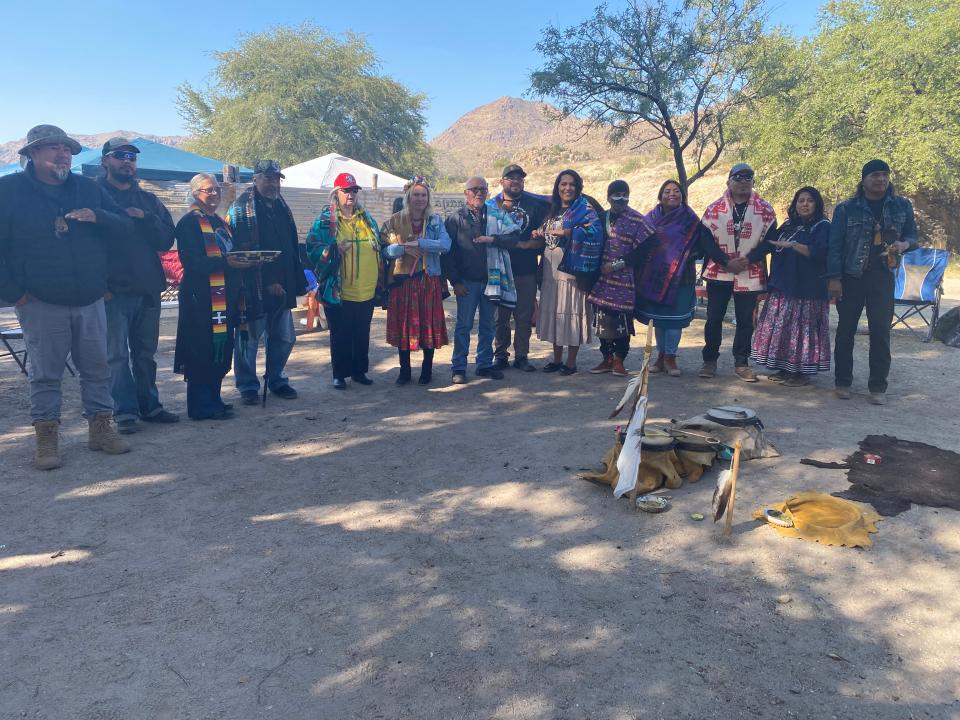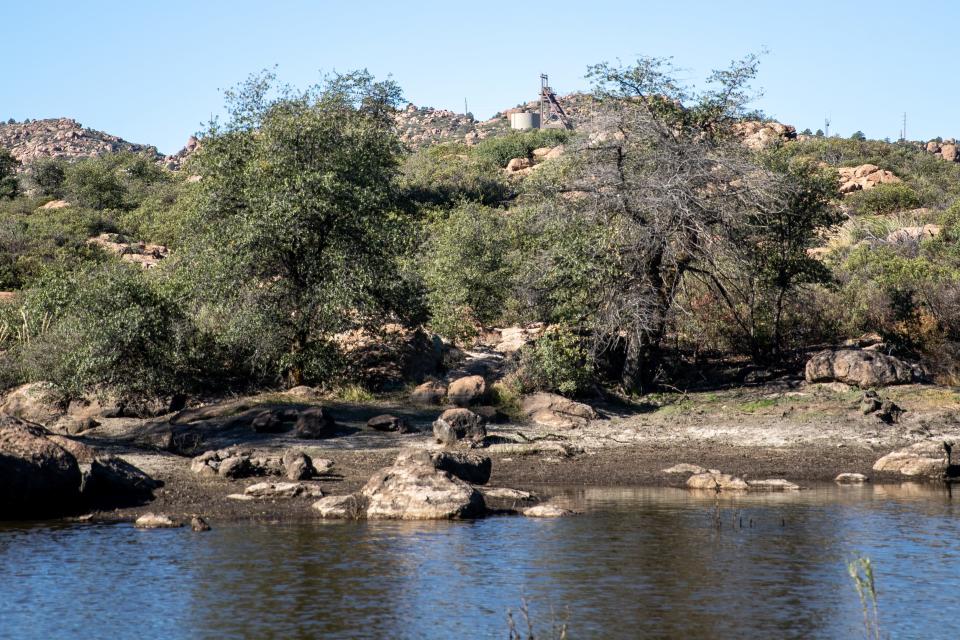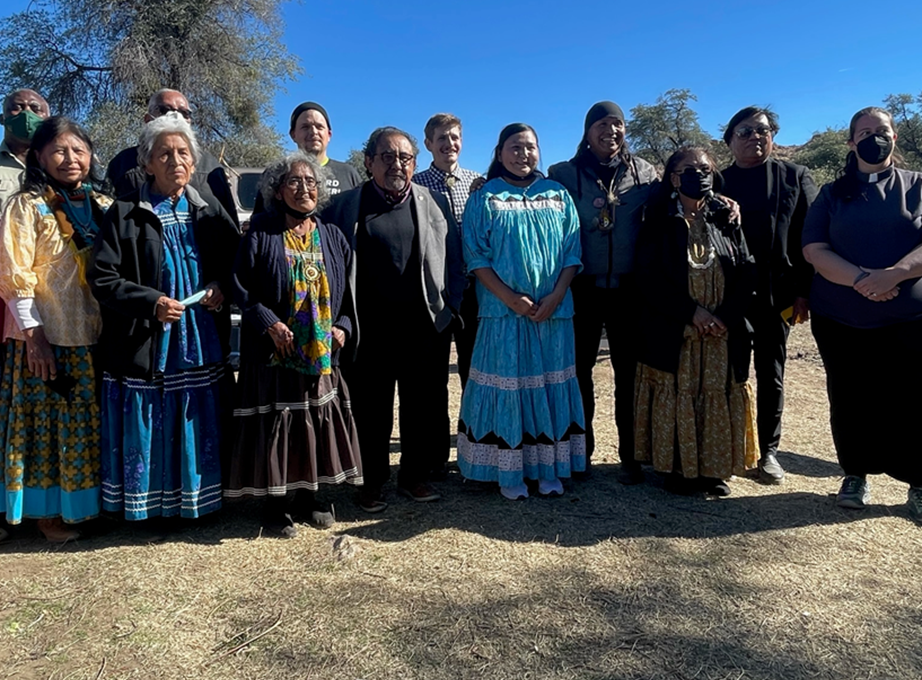Appeals court rejects Apache Stronghold bid to block Resolution Copper mine at Oak Flat
A federal appeals court on Friday narrowly rejected a bid by the grassroots group Apache Stronghold to block a land swap that would allow copper mining at Oak Flat, one of the Apache peoples' most sacred sites.
The 9th U.S. Circuit Court of Appeals agreed with a lower court's ruling that the mine would not pose a substantial burden to First Amendment religious practice rights, setting up a likely showdown at the U.S. Supreme Court. The decision to deny a request for a preliminary injunction to block the land swap came on a 6-5 vote in a case that was argued nearly a year ago.
The suit, Apache Stronghold v. United States, was filed in January 2021 in federal district court. After losing that ruling, the Native rights group took the case to the appeals court, where a three-judge panel rejected Apache Stronghold's assertion that the mine would pose a substantial burden to their First Amendment religious practice rights.
The case went to the full circuit court last March. The ruling won't allow Resolution Copper to begin mining copper from Oak Flat, a step that requires the completion of the land swap. The company's plans could be further delayed by two other lawsuits related to a revised environmental impact statement, as well as the expected appeal of this ruling to the Supreme Court.
Resolution promises the mine, near Superior southeast of Phoenix, will bring jobs and economic growth to the once-active mining region, but opponents say it would obliterate a sacred site and desecrate places where Indigenous people have prayed and lived for centuries.

Wendsler Nosie, the head of Apache Stronghold, said opponents would continue to fight all the way to the U.S. Supreme Court.
“Oak Flat is like Mount Sinai to us — our most sacred site where we connect with our Creator, our faith, our families, and our land,” he said. “Today’s ruling targets the spiritual lifeblood of my people, but it will not stop our struggle to save Oak Flat.
"We vow to appeal to the Supreme Court.”
Resolution Copper President and General Manager Vicky Peacey applauded the decision.
"There is significant local support for the project, which has the potential to supply up to one-quarter of U.S. copper demand, add up to $1 billion a year to Arizona’s economy, and create thousands of local jobs in a region where mining has played an important role for more than a century," she said.
The mining company said it would continue to work with local communities and tribes to shape the project as it seeks to understand and address the concerns that have been raised. Peacey noted that there has already been a decades of consultation and review.

Mine case dates back 2 decades
It's the latest in a decades-long battle that began in December 2014, when Congress authorized the U.S. Forest Service to trade the 2,200-acre Oak Flat Campground, also known by its Apache name of Chi'chil Biłdagoteel, for parcels of environmentally sensitive private land owned by Resolution, a subsidiary of British-Australian mining companies Rio Tinto and BHP.
Resolution had sought the land swap for about 10 years but had been repeatedly denied due to sustained opposition by Native peoples and environmentalists.

To obtain the copper ore, Resolution will use a method known as block cave mining, in which tunnels are drilled beneath the ore body, and then collapsed, leaving the ore to be moved to a crushing facility. Eventually, the ground will subside, leaving behind a crater about 1,000 feet deep and nearly 2 miles across.
The Forest Service published the final environmental impact statement and draft decision for the copper mine and land swap five days before the end of the Trump administration in January 2021. Apache Stronghold filed a lawsuit in January 2021 in federal court to stop the land swap citing the First Amendment's religious rights guarantee.
The San Carlos Apache Tribe and a coalition of environmentalists followed with more litigation. Those two lawsuits are on hold but can be restarted upon the release of a new environmental impact statement.
Sacred places in Arizona: Indigenous people find legal, cultural barriers to protect sacred spaces off tribal lands
On March 1, 2021, the Forest Service withdrew the statement and said it would reinitiate consultations with tribes.
Rep. Raul Grijalva, D-Ariz., said Friday the appeals court latest ruling was wrong.
"This land transfer was a bad deal enacted in bad faith, and the courts must see it for the environmental and human rights disaster that it is," he said.

Apache Stronghold is represented by religious freedom law firm Becket Law and private attorneys Michael V. Nixon and Clifford Levenson.
“Blasting a Native American sacred site into oblivion is one of the most egregious violations of religious freedom imaginable,” said Luke Goodrich, vice president and senior counsel at Becket. “The Supreme Court has a strong track record of protecting religious freedom for people of other faiths, and we fully expect the Court to uphold that same freedom for Native Americans who simply want to continue core religious practices at a sacred site that has belonged to them since before the United States existed.”
Apache Stronghold has 90 days to appeal to the Supreme Court.
Debra Krol reports on Indigenous communities at the confluence of climate, culture and commerce in Arizona and the Intermountain West. Reach Krol at debra.krol@azcentral.com. Follow her on X, formerly known as Twitter, @debkrol.
Coverage of Indigenous issues at the intersection of climate, culture and commerce is supported by the Catena Foundation.
My articles are free to read, but your subscriptions support more great reporting. Please consider subscribing today.
This article originally appeared on Arizona Republic: Appeals court rejects bid to block Resolution Copper mine at Oak Flat

